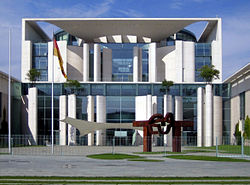| Revision as of 00:45, 22 September 2006 edit83.109.170.59 (talk) English language← Previous edit | Revision as of 00:47, 22 September 2006 edit undo83.109.170.59 (talk) article of dubious qualityNext edit → | ||
| Line 5: | Line 5: | ||
| ] | ] | ||
| ] | ] | ||
| {{otheruses4||the pre-1945 equivalent|Reich Chancellery}} | |||
| The '''Chancellor's Office''' (Chancellery) (in German, ], or more commonly '''Kanzleramt''') is the office of the ] ''(])'', the head of the ] federal government ''(])''. The chief of the Chancellery (''Chef des Bundeskanzleramtes'') holds the rank of either a state secretary ''(Staatssekretär)'' or a federal minister ''(Bundesminister)''. The chief's primary function is to assist the Chancellor in coordinating the activities of the Federal Government. Despite this important position in the German political system, the Chancellery and its chief largely work in the background and have little public attention. The current chief of the Chancellery is ]. | The '''Chancellor's Office''' (Chancellery) (in German, ], or more commonly '''Kanzleramt''') is the office of the ] ''(])'', the head of the ] federal government ''(])''. The chief of the Chancellery (''Chef des Bundeskanzleramtes'') holds the rank of either a state secretary ''(Staatssekretär)'' or a federal minister ''(Bundesminister)''. The chief's primary function is to assist the Chancellor in coordinating the activities of the Federal Government. Despite this important position in the German political system, the Chancellery and its chief largely work in the background and have little public attention. The current chief of the Chancellery is ]. | ||
Revision as of 00:47, 22 September 2006






The Chancellor's Office (Chancellery) (in German, Bundeskanzleramt, or more commonly Kanzleramt) is the office of the Chancellor (Bundeskanzler), the head of the German federal government (Bundesregierung). The chief of the Chancellery (Chef des Bundeskanzleramtes) holds the rank of either a state secretary (Staatssekretär) or a federal minister (Bundesminister). The chief's primary function is to assist the Chancellor in coordinating the activities of the Federal Government. Despite this important position in the German political system, the Chancellery and its chief largely work in the background and have little public attention. The current chief of the Chancellery is Thomas de Maizière.
The Chancellery is also the name of the building that houses the personal offices of the Chancellor and the Chancellery staff. From 1949 to 1999, the Chancellery, along with the rest of the federal administration, was situated in Bonn. The Palais Schaumburg was originally used until the construction of a new Chancellery building in 1976. In the summer of 1999, as part of the German government's move to Berlin, the Chancellery was temporarily housed in the former GDR State Council building (Staatsratsgebäude) in eastern Berlin as the new Chancellery building was not yet finished at the time. The current Chancellery building (opened in the spring of 2001) is a masterpiece of modern architecture. Occupying 12,000 square meters (129,166 square feet), it is also one of the largest government headquarters buildings in the world. By comparison, the new Chancellery building is eight times the size of the White House.
Heads of the Chancellery since 1950
Directors of the Chancellery attend Cabinet meetings. They may also sit as members of the Cabinet if they are also given the position of Minister for Special Affairs, similar to that of Minister without Portfolio in some other countries.
- 1950–1951: Walter Hallstein
- 1951–1953: Otto Lenz
- 1953–1963: Hans Globke
- 1963–1966: Ludger Westrick (also Minister for Special Affairs and the Defense Council, 1964-66)
- 1966–1967: Werner Knieper
- 1967–1969: Karl Carstens
- 1969–1972: Horst Ehmke (also Minister for Special Affairs)
- 1972–1974: Horst Grabert
- 1974–1980: Manfred Schüler
- 1980–1982: Manfred Lahnstein
- 1982: Gerhard Konow
- 1982–1984: Waldemar Schreckenberger
- 1984–1989: Wolfgang Schäuble (also Minister for Special Affairs)
- 1989–1991: Rudolf Seiters (also Minister for Special Affairs)
- 1991–1998: Friedrich Bohl (also Minister for Special Affairs)
- 1998–1999: Bodo Hombach (also Minister for Special Affairs)
- 1999-2005: Frank-Walter Steinmeier
- since 2005: Thomas de Maizière (also Minister for Special Affairs)